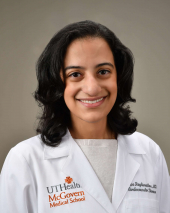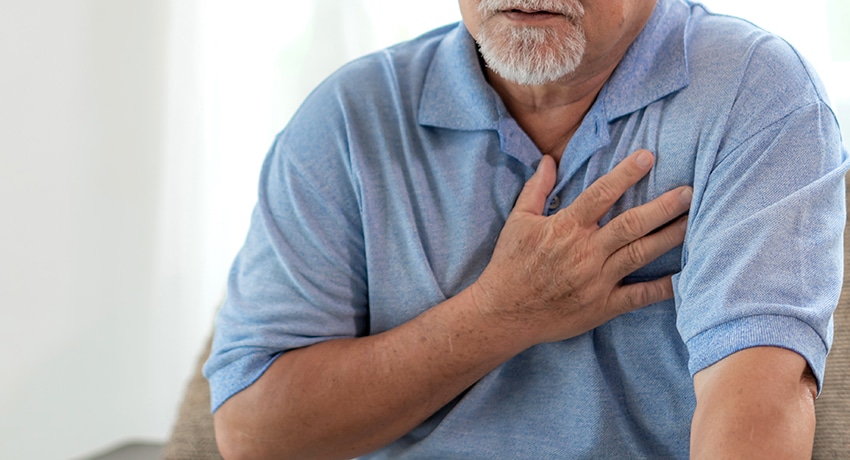
For American Heart Month, Deepa Raghunathan, MD, cardiologist with UT Physicians Multispecialty – The Heights and assistant professor of cardiology with McGovern Medical School at UTHealth Houston, explains the difference between a heart attack, heart failure, and sudden cardiac arrest.
She also gets to the heart of the matter with lifestyle tips to keep the body’s most important organ healthy and well-functioning.
What’s the difference?
Heart attack
A heart attack, also known as myocardial infarction, is a medical emergency that results when blood flow is partially or completely cut off to a part of the heart.
“A heart attack is normally due to a coronary artery blockage,” Raghunathan said. “The blockage normally happens when a buildup of cholesterol plaque stops the blood flow and the heart can no longer get oxygen.”
Heart failure
Heart failure, also known as congestive heart failure, is a condition where the heart does not pump blood as well as it should.
“Heart failure is when the heart muscles are weak and not able to pump blood to the rest of the body effectively,” Raghunathan said. “This can be caused by a number of things.”
The top reason for heart failure is a heart attack. Often a heart muscle dies during a heart attack because it did not receive oxygen. The second reason is due to untreated high blood pressure. The heart muscles become weak because the high blood pressure causes them to work too hard.
Other drivers of heart failure include: chemotherapy, certain medications, polypharmacy (or use of multiple drugs by a single patient), illicit drug use, alcohol overconsumption, and genetics.
Sudden cardiac arrest
Sudden cardiac arrest is a medical emergency from loss of heart function, which results in loss of consciousness, and, ultimately, cessation of breathing. It is caused by an electrical disturbance in the heart.
“Sudden cardiac arrest is an electrical problem with the heart that causes it not to beat anymore,” the cardiologist said. “The heart stops pumping completely, and it needs to be treated immediately with CPR and then electrical shocks from a defibrillator.”
The most common reasons for sudden cardiac arrest are a previous heart attack or heart failure. Both may cause changes to the heart’s electrical activity that can lead to sudden cardiac arrest.
Ways to keep heart problems away
Eat a plant-based diet
“The best way to prevent a heart attack is to prevent the buildup of cholesterol,” Raghunathan said.
The best way to keep cholesterol low is to eat a plant-based diet as recommended by the American College of Cardiology. This type of diet consists of vegetables and fruits and non-animal proteins, such as tofu, nuts, beans, and soy.
For those who do not wish to give up animal proteins, limit meat consumption. Avoid red meats, which have high saturated fat, and opt for the leaner ones, such as poultry and fish.
Avoid processed or pre-made foods
Avoid eating processed foods, or pre-made foods, such as frozen meals, meat products, packaged snacks, fast foods, and sodas. Most of these foods contain three harmful agents to the heart: fat, sodium, and sugar. Saturated fats build cholesterol plaque, sodium increases blood pressure, and sugar increases inflammation in heart arteries.
“Processed and pre-made foods are not good for your heart, and they offer nearly no nutritional value,” Raghunathan said. “Try to reach for fresh, whole foods, and try to make your own meals where you control the fat, salt, and sugar.”
Stay active
The heart is essentially a powerful muscle. Exercise pumps more blood to the body and make the heart stronger. Regular exercise that gets the heart rate up effectively reduces cholesterol plaque buildup and lowers blood pressure.
“Exercise really is the best free medicine for your heart,” the physician said. “It’s important to stay active doing physical activities you enjoy. Exercise isn’t just good for your heart, it keeps your whole body fit and limber. It’s key to quality of life and healthy aging.”
Talk to a doctor
Some people are at greater risk for heart attack, heart failure, and/or sudden cardiac arrest due to family history, congenital heart conditions, or other uncontrollable health factors.
“At the end of the day, people still need to talk to a physician about their risk for developing heart problems and see what they can do to reduce their risk in the future,” Raghunathan said. “Knowledge and prevention really is key.”



